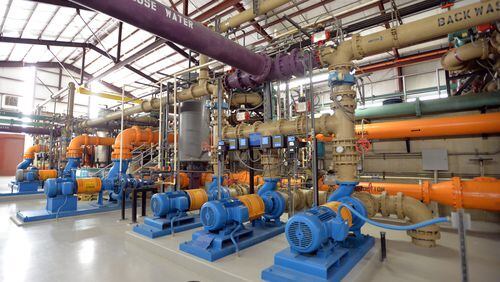Fulton County leaders will decide in June whether to increase water rates 5 percent annually for the next three years to pay for half a billion dollars in upgrades to water lines and sewage treatment plants.
County Commissioners will hold the first in a series on public hearings on the rate increase — the first in nearly a decade — Tuesday.
Now, Fulton water users pay $8.41 per 1,000 gallons, the lowest rate in the metro area, said David Clark, the county’s director of public works. With the average house using about 6,000 gallons monthly, the increase is expected to cost roughly $3 a month in the first year.
“Obviously, nobody wants to pay more for anything,” Clark said. “We always tied changes to our rates to very specific projects. We’re hoping those people who are frustrated can at least see we’re showing them very specific projects, as opposed to their money going into a nebulous black hole.”
The project list, which commissioners approved earlier this month, includes expanding wastewater treatment plants, improving the wastewater collection system and water system and repairing and relocating water and sewer lines, often in preparation for new road projects.
All told, the projects will cost $523.5 million.
More than half that cost is due to planned expansions of two treatment plants that are at or near capacity: Little River and Big Creek. The state Environmental Protection Division prohibited the county from expanding those plants until the county complied with the Metropolitan North Georgia Water Planning District's water conservation plan. The county was out of compliance because it was selling water to some customers for less than it should after shutting down the Cauley Creek plant.
That lack of compliance also limited construction in north Fulton by restricting access to sewer service.
The county’s plan calls for increasing the capacity of Little River, which serves Mountain Park and parts of Milton, Alpharetta and Roswell, from 1 million gallons a day to 2.6 million gallons a day. Big Creek’s capacity would increase from 24 million gallons daily to 38 million gallons a day. It serves parts of Roswell, Alpharetta, Milton and Johns Creek.
The county plans to take out bonds to pay for the construction.
“Because of the growth the county has seen in north and south Fulton since coming out of the housing crisis, almost all of these are capacity improvements,” Clark said.
Other work includes upgrading 19 pump stations, extending water mains at Kimball Bridge Road and in Alpharetta, building water main loops in Milton and relocating lines before roadwork is done across the county.
The rate increase should cover the cost to repay the bonds, Clark said, but more increases are possible in the years that follow.
If commissioners approve the increases, they will go into effect Oct. 1.
“It’s pretty important,” Clark said.
If commissioners decide not to fund the projects through a rate increase, they will have to cut projects or look for other ways to cover the costs.
The public meetings all begin at 6:30 p.m. They will be held:
- Tuesday at the Fulton County North Service Center at 7741 Roswell Road in Atlanta;
- May 2 at the Fulton County South Service Center at 5600 Stonewall Tell Road in College Park;
- May 9 at the Water Resources Operations Center at 11575 Maxwell Road in Alpharetta;
- May 16 at the Southwest Arts Center at 915 New Hope Road Southwest in Atlanta.








